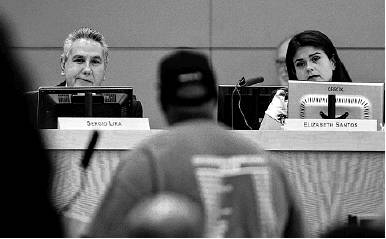Activist sues HISD after ban from school district premises
By Jacob Carpenter STAFF WRITER
A community activist banned from Houston ISD premises after threatening employees and shouting during a school board meeting has filed a federal lawsuit against the district, alleging a violation of his free speech rights.
Gerry Monroe, an outspoken fixture in the district for the past several years, said district officials illegally banned him from district property in April, stemming from two incidents within three days. In one, during the public comment portion of a board of trustees meeting, Monroe wore a T-shirt bearing a middle school principal’s face and, at times, a white bandanna over his mouth, while loudly demanding the district remove the principal from the school: “Either you take her out, or I’m going to take her out.” In the second incident, HISD officials alleged Monroe banged on a table, cursed at staff and threatened to ruin the career of an employee during a private meeting.
In his lawsuit, Monroe said HISD officials are punishing him for his frequent criticism of district leaders. At public meetings, Monroe often accuses school board members of racism, corruption and mismanagement.
“In retaliation for Gerry Monroe speaking this unpalatable truth to and about HISD, HISD has now moved to silence Gerry Monroe on these and other important matters of public concern — potentially forever,” Monroe’s lawyer, Scott Newar, wrote in the complaint. Newar declined to comment on the filing Wednesday.
In a letter banning Monroe indefinitely from all HISD premises, district officials wrote that he violated policies surrounding proper decorum in district buildings and threatened the safety of employees.
“Your conduct has repeatedly disrupted HISD board meetings and school district operations, and can no longer be tolerated,” HISD Business Operations Officer Eugene Salazar wrote to Monroe, adding Monroe could petition to lift the ban in April 2020.
District officials did not respond to requests for comment about the lawsuit Wednesday.
Under Texas education codes, school administrators can restrict anybody from district premises who “poses a substantial risk of harm to any person” or continues to “behave in a manner that is inappropriate for a school setting” after a verbal warning.
“I think the key is there’s some behavior outside what you would expect for the purposes of advancing the goals of the educational institution,” said Carlos Flores, a Laredo-based lawyer who recently represented a Texas school board member banned from most district premises. “There is a bit of discretion, and, of course there’s a grievance procedure where you can challenge the discretion.”
Monroe, a Yates High School graduate who lost his bid for HISD’s school board in 2017, has become one of the district’s most polarizing community figures. His frequent and sometimes flamboyant outbursts — he once threw dollar bills at trustees during a board meeting — often draw attention from local media and district onlookers. Monroe, who is black, frequently invokes racial tensions that simmer within HISD, recently labeling Hispanic board members as “The New Education Klan” amid their reluctance to permanently retain the district’s black interim superintendent, Grenita Lathan.
Some HISD board members and community activists have denounced Monroe’s actions and comments, decrying his accusations of racism as spurious and voicing fear about various threats Monroe has leveled. Monroe also has made sexist and prejudicial comments on social media against some female board members, suggesting in one post that a trustee needed the help of a “butt enhancer.”
Other HISD parents and activists view Monroe as a champion of Houston’s black children, who perform worse on standardized tests, enroll in college at lower rates and receive discipline more frequently than Hispanic, white and high-income students. Trustee Jolanda Jones appointed Monroe last year to a board-driven committee reviewing special education policies.
During a mid-April board meeting, Monroe addressed board members about allegations involving an employee bringing a gun onto campus at Fonville Middle School, located on Houston’s north side. In a two-minute speech, Monroe called the principal an idiot and implored HISD leaders to take action against her.
“Do something with that idiot over there,” Monroe said. “This is the mandate: Either you take her out, or I’ll take her out. Ateacher on a campus with a gun in her purse, and y’all still talking about it? I ain’t talking about it in the morning.”
HISD’s board policy dictates citizens “shall not engage in conduct that disrupts or interferes with” meetings. Monroe’s tone did not differ significantly from prior board meetings, during which he often shouted and criticized district officials by name.
District officials said Monroe’s public outburst followed a private uproar at the district’s main administration building two days earlier. During a meeting to discuss an employee’s reassignment, staff members called HISD police to “restore peace” after Monroe yelled “in an attempt to further intimidate HISD district officials,” according to the notice banning Monroe from district premises. Monroe’s legal complaint did not address the district’s allegations.
HISD Board President Diana Dávila said trustees have had concerns about Monroe’s behavior, but ultimately disagreed on whether to restrict his access to public meetings.
“This was an administrative call, so if they felt unsafe during those days leading up to (the ban), then I respect that’s the way they felt,” Dávila said.
Pete Linzer, a professor of law at the University of Houston, said citizens have extensive free speech rights under criminal statutes, with fewer protections afforded under civil law.
“If you were trying to convict this guy, you wouldn’t do it,” Linzer said. “But when you’re talking about banning somebody from the premises, that’s a different question.
“It’s a tough question. I think the guy was really close to the line. That exact language he used is, as far as I’m concerned, the biggest problem.” jacob.carpenter@chron.com

